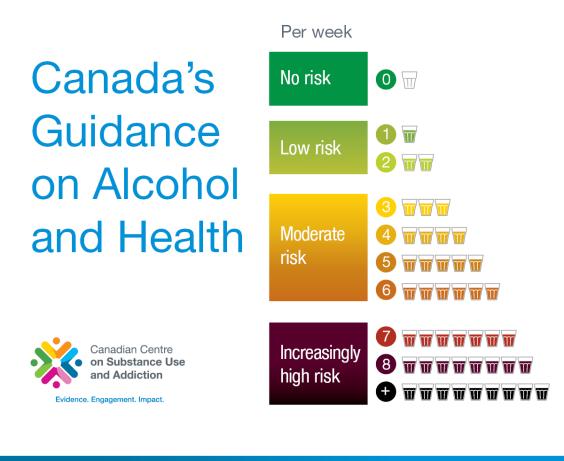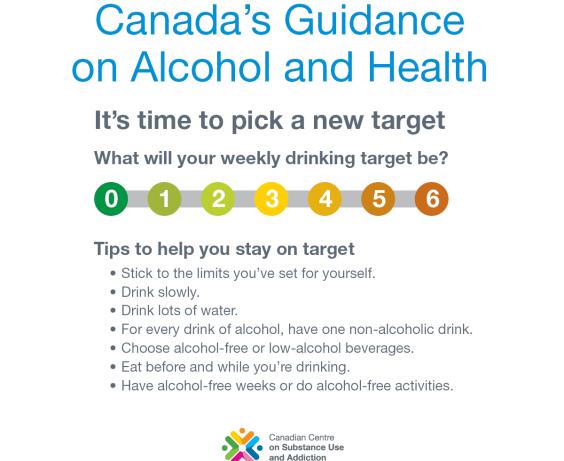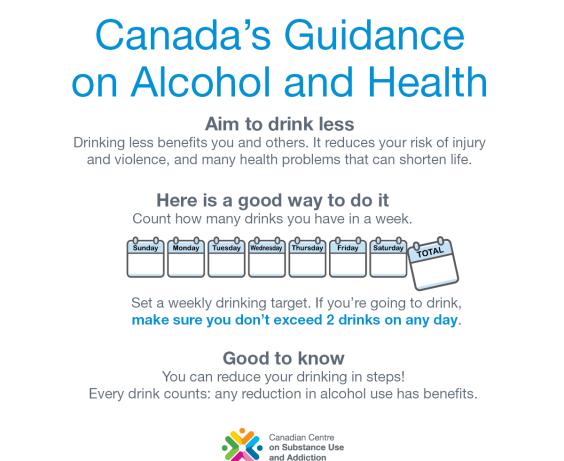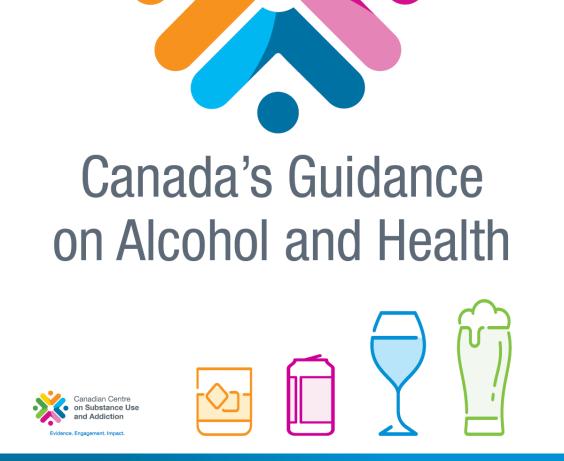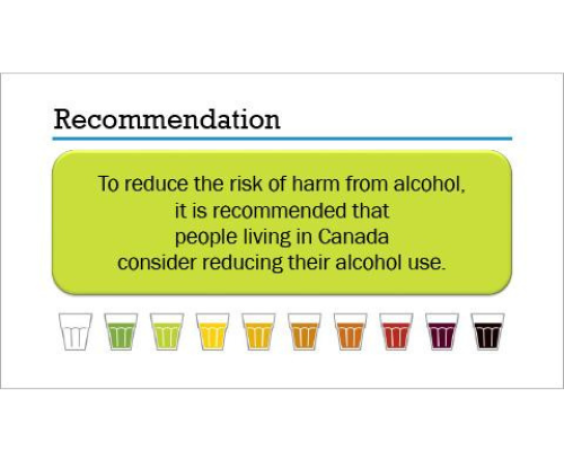The two-and-a-half-year process culminated in the creation of Canada’s Guidance on Alcohol and Health, which replaces the LRDGs. Canada’s Guidance on Alcohol and Health provides people living in Canada with the information they need to make well-informed and responsible decisions about their alcohol consumption.
Overview

Canada’s Guidance on Alcohol and Health provides evidence-based advice on alcohol to support people in making informed decisions about their health. The guidance is based on the latest research on alcohol-related risks and replaces Canada’s Low-Risk Alcohol Drinking Guidelines (LRDGs) issued in 2011.
The guidance is based on the principle of autonomy in harm reduction and the fundamental idea behind it that people living in Canada have a right to know that all alcohol use comes with risk.
Key points from the guidance include:
- There is a continuum of risk associated with weekly alcohol use where the risk of harm is:
- 0 drinks per week — Not drinking has benefits, such as better health, and better sleep.
- 2 standard drinks or less per week — You are likely to avoid alcohol-related consequences for yourself or others at this level.
- 3–6 standard drinks per week — Your risk of developing several types of cancer, including breast and colon cancer, increases at this level.
- 7 standard drinks or more per week — Your risk of heart disease or stroke increases significantly at this level.
- Each additional standard drink radically increases the risk of alcohol-related consequences.
- Consuming more than 2 standard drinks per occasion is associated with an increased risk of harms to self and others, including injuries and violence.
- When pregnant or trying to get pregnant, there is no known safe amount of alcohol use.
- When breastfeeding, not drinking alcohol is safest.
- No matter where you are on the continuum, for your health, less alcohol is better.
CCSA is creating knowledge mobilization products that will be tailored to meet the needs of our audience. Please check back with us in the coming months as we release these new resources.
Communications Toolkit: Canada’s Guidance on Alcohol and Health
About this Toolkit
This toolkit contains CCSA resources related to Canada’s Guidance on Alcohol and Health that are available to your organization at no cost. We invite you to use the resources to help promote Canada’s Guidance on Alcohol and Health and amplify the key messages.
What’s in this Toolkit?
Printable key message posters
Social media assets
Key messages presentation
Additional support resources
You do not need permission to use these materials for personal use or to distribute them as-is. Please email us at permissions@ccsa.ca to let us know how and where you’re using them for professional purposes. If you’re adapting them, please complete our online copyright permission form.
Get in Touch
For inquiries or assistance with using this toolkit, please contact alcohol@ccsa.ca.
Posters and Brochure
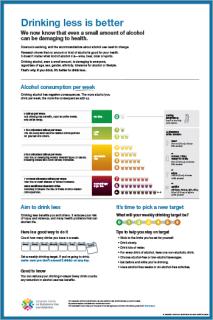
Canada’s Guidance on Alcohol and Health, Public Summary: Drinking Less Is Better (Infographic)
Summarizes the recommendations in Canada’s Guidance on Alcohol and Health in simple terms and...

Canada’s Guidance on Alcohol and Health, Public Summary: Drinking Less Is Better (Poster)
Summarizes the recommendations in Canada’s Guidance on Alcohol and Health in simple terms and...
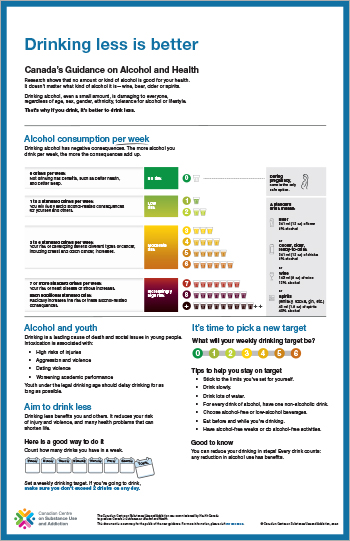
Drinking less is better: Canada’s Guidance on Alcohol and Health — Youth Version
Provides a youth-focused summary of the recommendations in Canada’s Guidance on Alcohol and...

Canada’s Guidance on Alcohol and Health, Public Summary: Drinking Less Is Better (Brochure)
Summarizes the recommendations in Canada’s Guidance on Alcohol and Health in simple terms and...
Social Media
Start the Online Conversation
CCSA has provided a variety of social media assets that you can share on your organization’s channel.
Download and post these images with accompanying text. Below are a few sample posts that you can use or feel free to create your own.
We encourage you to follow CCSA on our social media platforms and use the hashtag #DrinkLessLiveMore when you share these resources.
Project Background

Canada’s Guidance on Alcohol and Health replaces Canada’s Low-Risk Alcohol Drinking Guidelines (LRDGs). Since the release of the LRDGs in 2011, new evidence has been uncovered on alcohol-related mortality and morbidity. Research has also evolved on how drinking alcohol contributes to social harms. Other countries, including Australia, Denmark, France, the Netherlands, the United Kingdom and the United States, recently updated their guidelines to reduce the health risks of alcohol consumption.
Canada’s Guidance on Alcohol and Health is the result of a collaborative process among CCSA, health and social scientists, knowledge mobilization specialists and representatives of various Canadian organizations, including Health Canada. The process has been consensual and based on co-operation. All parties participated with equal status and the expression of each parties’ points of views were encouraged.
Process Followed to Develop the Guidance on Alcohol and Health
In July 2020 with funding from Health Canada, CCSA began the project to update the LRDGs. The chart on Process and Documentation outlines the process that resulted in Canada’s Guidance on Alcohol and Health. Click the links in the chart to access the supporting documents produced as part of the process.
Public and Stakeholder Consultations

People in Canada should have access to the latest evidence-based advice on alcohol to support them in making informed decisions about its use. They should also have opportunities to have their voices heard and to share what matters to them when it comes to their health, well-being and alcohol consumption. Consulting throughout the guidance development process with the public, professionals and organizations concerned with alcohol, health and well-being was key to ensuring that Canada’s Guidance on Alcohol and Health meets the diverse needs of people and organizations in Canada and is accessible to all.
Public Consultation on the 2011 Low-Risk Alcohol Drinking Guidelines
CCSA held an online public consultation on the 2011 LRDGs between March 8 and April 18, 2021. This consultation was to understand the experiences of people in Canada with the LRDGs and their needs and expectations for updated guidelines. It was open to all people in Canada, including the general public, professionals and representatives from organizations with an interest in alcohol, health and well-being. A total of 4,846 people from every province and territory across Canada completed the online consultation questionnaire. The report, Update of Canada’s Low-Risk Alcohol Drinking Guidelines: Summary of Findings from Public Consultation, outlines how the consultation was conducted and what we heard.
Consultations with Representatives of Health Organizations

CCSA held virtual focus groups with counsellors and treatment providers, people with lived or living experience of substance use and representatives from public health organizations, professional associations, mental health and addictions organizations, and organizations that treat chronic disease. The goal was to obtain their perspective on the familiarity and understanding of people living in Canada with the LRDGs and related issues. The focus groups also discussed messaging and communication strategies that could increase awareness of the LRDGs among target
groups such as youth and women.
A total of 48 representatives participated in the focus groups. The results informed discussions about how to present the conclusions of the LRDG update. They are included in the report, Update of Canada’s Low-Risk Alcohol Drinking Guidelines: Summary of Stakeholder Focus Groups.
Public Consultation on Guidance on Alcohol and Health
The report, Update of Canada’s Low-Risk Alcohol Drinking Guidelines: Final Report for Public Consultation, includes the public summary, the technical summary and the technical report for the new Guidance on Alcohol and Health. It describes how the development of the guidance used a public-health perspective to provide the latest evidence-based advice on alcohol to support informed decisions about its consumption. The report was released for consultation between Aug. 29 and Sept. 23, 2022, to ensure the readability, clarity and validity of the final products. CCSA sought comments from people in Canada on all aspects of the final report through an online survey. We received almost a thousand submissions, which have been reflected in the final products for Canada’s Guidance on Alcohol and Health.

Canada's Guidance on Alcohol and Health
Frequently Asked Questions
Supporting Documents
Document name | Date published | Description |
|---|---|---|
| Canada’s Guidance on Alcohol and Health: Final Report | 2023 | Summarizes the evidence drawn from worldwide evidence reviews, mathematical modelling, and extensive consultations and discussions. The Guidance provides people in Canada with accurate and current information about the risk of harms associated with the consumption of alcohol. Results will also provide the evidence base for future alcohol policy and alcohol use disorder prevention resources. |
| Lifetime Risk of Alcohol-Attributable Death and Disability | 2023 | Examines the lifetime risk of death and disability for various levels of alcohol consumption. The report also examines separate alcohol guidelines for males and females, and offers recommendations for alcohol consumption as measured in grams per day. |
| Canada’s Guidance on Alcohol and Health, Public Summary: Drinking Less Is Better (Infographic) | 2023 | Summarizes the recommendations in Canada’s Guidance on Alcohol and Health in simple terms and illustrations. Offers concise, image-based explanations of the risks and harms from alcohol consumption on an increasing scale, as well as tips to reduce those risks |
| Lifetime Risk of Alcohol-Attributable Death and Disability | 2022 | Examines the lifetime risk of death and disability for various levels of alcohol consumption. |
| Update of Canada’s Low-Risk Alcohol Drinking Guidelines: Overview of Reviews of the Association Between Alcohol Use and Aggression and Violence | 2022 | A review of the association between alcohol use and violence, including patterns of drinking, as it relates to perpetration of and victimization by aggression. |
| Effect of Alcohol Consumption on the Development of Depression, Anxiety and Suicidal Ideation: Update of a Systematic Review | 2022 | Assesses the link between alcohol consumption and the development of depression, anxiety and suicidal ideation. |
| Commissioned Report: Update on Canada’s Low-Risk Alcohol Drinking Guidelines: Summary of Stakeholder Focus Groups | 2022 | Summarizes findings of eight virtual focus groups conducted with CCSA stakeholders. Groups explored the familiarity and understanding of current LRDGs, knowledge mobilization and understanding of standard drink recommendations. |
| Sex, Gender and Alcohol: What Matters for Women in Low-Risk Drinking Guidelines? | 2022 | Reviews research on the effects of alcohol through a sex and gender lens. With a focus on women, it examines the sex-specific effects of alcohol on male and female bodies. |
| Update of Canada’s Low-Risk Alcohol Drinking Guidelines: Final Report for Public Consultation | 2022 | Summarizes worldwide evidence reviews, mathematical modelling, consultations and discussions. It aims to provide people in Canada with accurate, up-to-date information about the risks and harms associated with the use of alcohol. Includes the public overview and technical report. |
| Update of Canada’s Low-Risk Alcohol Drinking Guidelines: Evidence Review Technical Report | 2022 | Reviews and updates the evidence on the effects of alcohol use on physical health, mental health and social harms. The report is intended for those interested in understanding the process followed in developing new alcohol consumption guidelines. |
| Update of Canada’s Low-Risk Alcohol Drinking Guidelines: Disclosure of Affiliations and Interests | 2021 | This declaration of interests is a list of affiliations, and financial and intellectual interests from the past three years for members of the Low-Risk Alcohol Drinking Guideline Executive Committee and the Scientific Expert Panels. |
| Update of Canada’s Low-Risk Alcohol Drinking Guidelines: Summary Evidence on Understanding and Response to Alcohol Consumption Guidelines | 2021 | This is an update of the evidence review produced for the 2016 United Kingdom Chief Medical Officers alcohol guidelines group, to determine how people understand and respond to official public health guidance. |
| Update of Canada’s Low-Risk Alcohol Drinking Guidelines: Summary of Findings from Public Consultation | 2021 | Summary of Findings from Public Consultation product description with, "A summary of Canadians’ experiences with the current LRDGs and their needs and expectations for updated guidelines, based on responses from 4,845 participants. |
| Update of Canada’s Low Risk Alcohol Drinking Guidelines: Terms of Reference | 2021 | Outlines the terms of reference for the initiative to update Canada’s Low-Risk Alcohol Guidelines. Includes information on the project scope, governance, scientific expert panels, and roles and responsibilities. |
| Update of Canada’s Low-Risk Alcohol Drinking Guidelines: Source Guidelines | 2021 | Summarises the current Canadian Low-Risk Alcohol Drinking Guidelines, the United Kingdom Chief Medical Officers’ Low Risk Alcohol Drinking Guidelines and the Australian Guidelines to Reduce Health Risks from Drinking Alcohol. |
| Update of Canada’s Low-Risk Alcohol Drinking Guidelines: Evaluation of Selected Guidelines | 2021 | Report presents evaluations of the current Canadian Low-Risk Alcohol Drinking Guidelines (2011), and guidelines from the United Kingdom (2016) and Australia (2020) using a standard instrument, the Appraisal of Guidelines for Research and Evaluation II. |
| Update of Canada’s Low-Risk Alcohol Drinking Guidelines: Development of Research Questions | 2021 | Outlines the research questions to support the update of the Low-Risk Alcohol Drinking Guidelines and the process used to develop them. |
| Update of Canada’s Low-Risk Alcohol Drinking Guidelines: Process and Timelines | 2021 | Interactive diagram providing an overview of the process to update Canada’s Low-Risk Alcohol Drinking Guidelines and the progress of the project. This document is updated regularly. |


